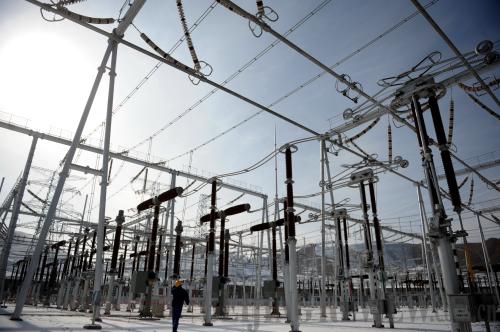|
 |
|
POWER GRID: In an attempt to ensure power supply, Gansu Electric Power Co. upgraded its power supply capacity in November (NIE JIANJIANG) |
Rising utility prices could soon cause businesses and their employees to struggle to keep their heads, and profits, above water. From November 20, water for commercial use such as car washing and bathhouse in Beijing increased by 20.18 yuan ($2.95) per ton to 61.68 yuan ($9.03), an increase of 49 percent.
"Our cost for single car washing will increase by 3 to 6 yuan ($0.44-0.88) at least," said Wang Bin, Market Manager of Beijing-based Yuefu Automobile Beauty Co. Ltd. "We are considering increasing the car washing prices."
A public hearing for the water price increase for domestic use will be held soon, said the Beijing Municipal Commission of Development and Reform.
Throughout 2009, different parts of China experienced water price hikes. More than 10 cities have already increased their water prices, while other cities are still contemplating an increase in water prices.
Luoyang City in central China's Henan Province, for instance, witnessed a price hike for domestic water use of more than 40 percent this August.
In truth, water is not the only basic resource to experience a price surge. On the same day of Beijing's water price increase, electricity prices increased by 0.028 yuan ($0.004) per kwh for non-domestic use nationwide, the National Development and Reform Commission (NDRC) stated.
On November 10, No. 93 gasoline prices increased to a record high 6.66 yuan ($0.97) per liter, the fifth price increase this year.
As a consequence, Beijing taxi passengers will have to pay an extra 1 yuan ($0.15) to reach their destinations.
"Although 1 yuan is not that much money for everyone, it reminds me of mounting price pressures," said passenger Xue Xiao.
Another unexpected utility increase came in November, when central China's Hubei, Anhui and Sichuan provinces were covered in an early and heavy blanket of snow, causing serious natural gas shortages and price surges.
According to Chengdu Evening News, the price for natural gas in Chengdu, provincial capital of Sichuan Province, has increased by more than 30 percent in this half of the year.
What should not be neglected are the climbing prices for essential resources, which have so far coincided with the numeric recovery of consumer price index (CPI) data, the main indicator of inflation.
This February, China experienced a CPI decrease of 1.6 percent year on year for the first time since 2002.
With the narrowing CPI decrease in recent months, the country is expecting a CPI increase, which is most likely to appear in December.
| 